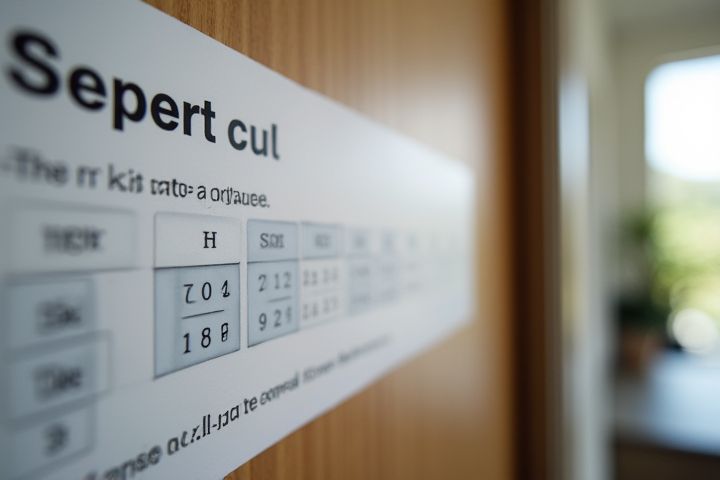
Scheduling a house inspection is crucial when buying or selling a property. It is recommended to arrange the inspection shortly after your purchase offer is accepted, ideally within 7 to 10 days. This timeframe allows you to assess the property's condition and identify any necessary repairs before finalizing the sale. For sellers, conducting a pre-listing inspection can provide transparency about the home's condition, potentially speeding up the transaction. You may also consider seasonal factors--for example, inspecting a roof in the fall or the HVAC system in spring--to ensure that all systems are functioning optimally.
When To Schedule A House Inspection
Before purchasing a property
Scheduling a house inspection before purchasing a property is crucial for uncovering potential issues that might not be visible during initial viewings. It's typically recommended to arrange the inspection within 7 to 10 days after your offer is accepted, allowing sufficient time for negotiations based on the findings. A professional inspection can cost anywhere from $300 to $500, depending on the property's size and location, providing invaluable insights that can save you thousands in repairs. Knowing the property's condition enables you to make informed decisions and negotiate better terms, ensuring your investment is sound.
Prior to selling a home
Schedule a house inspection at least 30 days before listing your home to allow time for necessary repairs and improvements. This proactive measure can reveal potential issues, such as plumbing leaks or electrical problems, which may otherwise deter buyers. By addressing these concerns in advance, you can enhance your property's value and appeal, potentially increasing its selling price by 1 to 3%. A pre-listing inspection also provides transparency, instilling buyer confidence and leading to faster sales.
After a major renovation
Scheduling a house inspection after a major renovation is crucial to ensure the work meets safety standards and local regulations. Ideally, you should arrange the inspection within a few weeks of completing the renovations to promptly identify any issues before they escalate. A professional inspector can assess structural integrity, electrical systems, plumbing, and other essential components, providing you with a detailed report. This proactive step protects your investment and gives you peace of mind, ultimately helping to increase your property's value.
Before the end of builder's warranty
Schedule your house inspection before the end of the builder's warranty, typically within 11 months of completion. This timing allows you to identify any construction defects or issues that may still be covered. Inspecting before the warranty expires ensures that you can have necessary repairs completed at no cost to you. Taking proactive steps now can save you significant expenses in the future.
Annually for maintenance check
Scheduling your house inspection annually is essential for maintaining the integrity of your property. Conducting this inspection allows you to identify potential issues before they escalate, possibly saving you thousands in repairs. Focus on key areas such as the roof, plumbing, and electrical systems, as these components can significantly impact your home's safety and functionality. For optimal results, choose a time in the spring or fall when weather conditions are typically stable, making it easier to identify leaks or moisture problems.
When buying insurance
Scheduling a house inspection is crucial when buying insurance, typically after an offer is accepted but before the closing process starts. Most insurance companies require a detailed property inspection report to assess risks accurately, often needing this within a 10-day window after the inspection. You should aim to complete your inspection ideally two to three weeks prior to closing to allow time for any necessary repairs or negotiations. This proactive approach can help you secure the best insurance rates and coverage tailored to your property's specific condition.
After a natural disaster
Scheduling a house inspection after a natural disaster is crucial, as properties may sustain hidden structural damage or safety hazards. Aim to book your inspection within the first few weeks post-disaster, as early detection can significantly reduce repair costs and increase safety. Working with a professional inspector familiar with disaster assessments ensures a thorough evaluation of your home's condition, including roof integrity, foundation stability, and potential water intrusion. Don't overlook the importance of addressing these issues promptly, as they can affect your property's value and your family's safety.
If planning to rent out
Schedule a house inspection as early as possible in the process, ideally before signing a lease or rental agreement, to ensure the property meets safety and health standards. A thorough inspection often takes 2 to 3 hours and can uncover hidden issues like plumbing problems or electrical hazards that could affect your rental income. If your home is being rented out, addressing significant repairs before tenants move in can prevent costly maintenance later and ensure a positive rental experience. Statistically, properties with inspections tend to attract tenants 30% faster, enhancing your rental strategy.
When property value increases
Scheduling a house inspection becomes crucial when property values increase, often reflecting heightened buyer interest and competitive markets. Studies indicate that home prices typically appreciate during economic growth phases, making a timely inspection vital for prospective buyers to assess the true condition of their investment. In such circumstances, you may face multiple offers, highlighting the importance of early inspection to make informed decisions before the market alters. Experts recommend conducting an inspection before listing your property or when considering purchase options to safeguard your financial future.
Prior to a major repair or upgrade
Scheduling a house inspection prior to a major repair or upgrade ensures that you are making informed decisions. A typical inspection may reveal underlying issues, such as plumbing or electrical problems, which could impact your renovation plans. For example, uncovering outdated wiring might necessitate a complete upgrade, potentially affecting your budget. Knowing these details in advance can save you time and money in the long run, allowing you to prioritize necessary repairs along with your desired upgrades.
